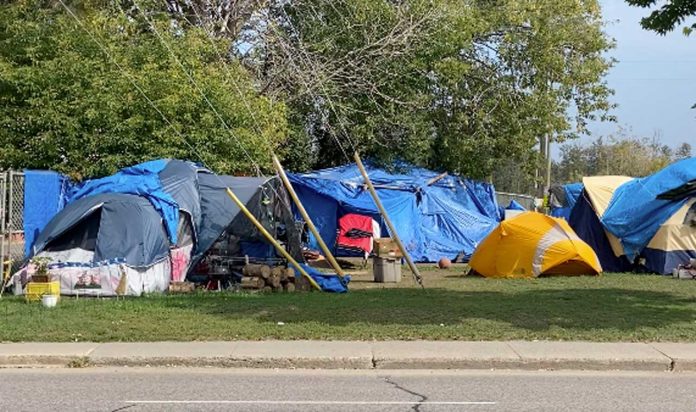THUNDER BAY – POLITICS – As housing affordability continues to decline and the cost of living rises, cities across Canada are seeing a marked increase in tent cities—temporary, makeshift communities that have sprung up in public spaces. From Vancouver to Halifax, tent cities are becoming an increasingly visible sign of a growing housing crisis that municipalities are struggling to address.
In Thunder Bay there are encampments at Kam River Park, along McVicars Creek, at Marina Park, and along the Current River as well as numerous other locations.
Many local residents find the tent encampments a source of problem as there are instances of local property crime. One recent encampment on the south side of the city was finally removed, but only after a massive level of complaint from residents about potential violence.
Thunder Bay has taken what the city calls a “Human Rights” approach to the issue, and won’t remove encampments without violence issues reported to police.
Some residents are more complacent about the impact on their neighbourhoods, and some of that is due to concerns of confrontation causing potential altercations.
It is a delicate situation as social problems meld with human rights, and community safety.
The Roots of the Crisis: Economic and Social Factors
The rise of tent cities can be traced to a combination of economic and social issues. Stagnant wages, skyrocketing rents, and a lack of affordable housing options are driving more people into homelessness.
Additionally, mental health challenges, substance abuse, and the effects of the COVID-19 pandemic have exacerbated the situation, leaving many Canadians without stable housing.
Tent cities often form because shelters are full or inadequate to meet the needs of those experiencing homelessness.
They offer a sense of community and relative safety for those who feel alienated from the formal support systems.
Municipal Responses: Policies and Challenges
Cities are responding to the rise of tent cities in varied ways, with some taking a compassionate approach while others focus on enforcement.
In Vancouver, for example, authorities have been working to connect tent city residents with housing and support services, although the availability of such services is often limited.
Toronto, facing similar challenges, has seen legal battles over the clearing of encampments, with advocates arguing that evictions are not the solution to homelessness.
Calgary and Edmonton have also grappled with tent cities, often resorting to dismantling them, which displaces residents but does not address the root causes of their existence.
The lack of a cohesive national strategy means that each city is left to devise its own approach, often leading to inconsistent and sometimes counterproductive outcomes.
Local Impact: How Thunder Bay is Affected
Thunder Bay, like many smaller cities, is beginning to see the effects of this national crisis. While the scale of tent cities in Thunder Bay is not as large as in major metropolitan areas, the signs of a growing housing problem are evident.
The city has seen an increase in homeless encampments, particularly in public parks and along the waterfront.
Local officials have expressed concerns about the safety and health of those living in these conditions, as well as the impact on community spaces. However, like other cities, Thunder Bay faces challenges in providing adequate housing and support services due to limited resources.
Community organizations and advocates are calling for more investment in affordable housing, mental health services, and harm reduction programs to address the root causes of homelessness in the city.
Looking Forward: Potential Solutions and Community Involvement
Addressing the rise of tent cities requires a multifaceted approach that includes immediate relief and long-term solutions. This could involve increasing the availability of affordable housing, enhancing social services, and fostering community involvement in supporting vulnerable populations.
In Thunder Bay, there is a growing recognition that a collaborative approach involving local government, community organizations, and residents is essential to finding sustainable solutions. By working together, the community can create a more supportive environment for those experiencing homelessness, ultimately reducing the need for tent cities.
The challenges are significant, but with the right strategies, there is hope that cities across Canada, including Thunder Bay, can begin to reverse the trend and provide stable housing for all.





